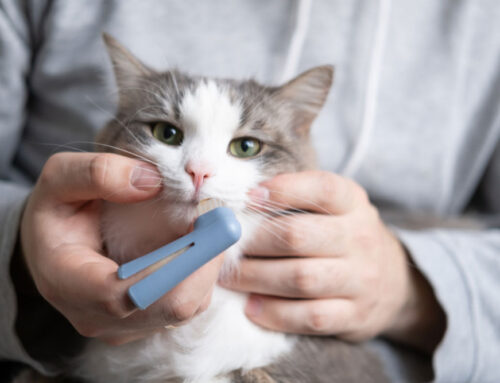Our four-legged companions are family and fill our lives with wagging tales, cozy purrs, and slobbery kisses. Research has shown that spending time with an energetic pup or a frisky feline improves your overall quality of life and wellness. However, sharing your home with a pet is more than filling their food bowl and walking in the park. Pets require regular home care, attention, and veterinary visits. The old adage that an ounce of prevention is worth a pound of cure especially holds true when it comes to caring for your pet. Regular wellness visits are vital to help ensure your four-legged companions remain healthy and by your side into their grey muzzle years.
You may forget your pet needs a veterinary exam, especially when they seem healthy and act normally. However, subtle changes you notice at home, such as bad breath or refusing a treat, may indicate a looming illness or other health problem. Our Palm City Animal Medical Center team explains the importance of regular wellness and preventive care for your pet.
Regular wellness care for your pet ensures early disease detection
Annual, or more frequent, veterinary exams are vital from puppy- or kittenhood and throughout your pet’s golden years. During a wellness visit, our veterinarian will discuss your pet’s home habits and lifestyle, because subtle changes you see can be a red flag certain disease states should be investigated. Although our veterinarians love spending time and cuddling with your pet, a physical examination involves much more, and provides a treasure trove of information about your pet’s health. Additionally, wellness visits allow our veterinarian to develop your pet’s health baseline, which is invaluable as pets develop problems as they age. Your pet’s thorough, nose-to-tail wellness check includes examining the following:
- Eyes — Some pets, especially those with flat faces (e.g., Persian cats, pug dogs, and French bulldogs) have increased risk of eye problems, including ulcers or dry eye. Regular check-ups will ensure your pet’s vision and eye health are maintained, and will prevent painful disease that could lead to vision loss without treatment.
- Mouth — More than 80% of pets will have dental disease by the time they are 3 years old. Regular check-ups combined with a home dental care routine will prevent disease progression and ensure your pet’s smile is always sparkling.
- Heart and lungs — Our veterinarian will listen to your pet’s heart and lungs, because changes in your pet’s heart rhythm and rate, and their lung sounds, may be an early indication of heart disease. Heart disease can occur in pets at any age, although it’s more common in senior pets. More than 15% of all cats and 10% of all dogs in the U.S. will develop some form of heart disease. Early detection will ensure more successful treatment and management.
- Ears and skin — Itchy skin and ears are common findings during veterinary wellness visits, especially in Florida pets. The hot, humid weather is the perfect environment for harmful skin bacteria to flourish on your pet’s body and in their ears, and pesky parasites cause many uncomfortable skin infections. Additionally, your pet’s skin problems may signal a more serious issue, such as poor nutrition, allergies, or metabolic disorders.
- Abdomen — Although our veterinarian may seem to be gently massaging your pet’s belly, they are actually feeling their internal organs, including the kidney, spleen, and bladder. For example, changes in organ size, such as an enlarged kidney, may indicate more serious kidney disease, while any lumps or masses on your pet’s organs could be cancer. One in four dogs will be diagnosed with cancer in their lifetime, so regular abdominal exams are vital for early detection and treatment.
- Body condition — Our veterinarian will weigh your pet and assign them a body condition score. More than 50% of U.S. cats and dogs are considered obese or overweight, which can decrease the precious time you have with your pet by more than two years.
- Muscles, bones, and joints — Muscle loss or difficulty getting up are clues that your pet may have osteoarthritis. We will check your pet’s musculoskeletal system and observe them walking, to determine whether they may be developing painful arthritis.
Preventive care protects your pet against infectious diseases

Vaccinations and parasite control are a key component of your pet’s wellness and preventive care. Young pets are especially susceptible to disease and illness, because their immune system is not fully developed. Senior pets and chronically ill pets are also at increased risk of contracting dangerous, and sometimes deadly, infectious diseases. Some pet owners may be reluctant to have their pet vaccinated—especially their indoor cat. However, any pet can accidentally get outside and contract a serious infection or disease and vaccines are the safest, most effective protection. Our veterinarian will discuss your pet’s lifestyle to determine the best vaccination protocol that will ensure their protection, as well as appropriate vaccinations for common pet illnesses, including parvovirus, distemper, hepatitis, and respiratory illnesses (e.g., bordetella or feline herpes virus).
Hitchhiking pests, such as fleas and ticks, also can cause serious illness in pets, including indoor pets, because pet owners can carry these pesky parasites inside, where they can transmit serious problems such as skin infections, diarrhea, heart disease, and brain infections. Regular parasite and heartworm prevention will ensure your pets are protected from potentially deadly diseases.
Our Palm City Animal Medical Center team wants to ensure your pets are protected and healthy through all their life stages. Call our office if you have any questions about your pet’s preventive care, or to schedule a wellness examination.








Leave A Comment